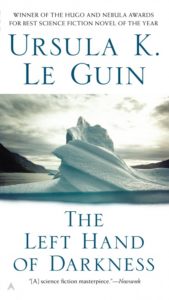“My imagination makes me human and makes me a fool; it gives me all the world and exiles me from it,” wrote Ursula K. Le Guin, one of the 20th century’s most successful world-hopping novelists.
 Because many of her novels and stories take place on other planets or in times far removed from our own, Le Guin has often been pigeonholed as a science fiction or fantasy writer. But she bristles at such restrictive categorization. “I’m a novelist and a poet,” she once said, “My tentacles are coming out of the pigeonhole in all directions.” And critics agree: Le Guin is now considered a literary master and was even included in The Western Canon by Harold Bloom, the most cantankerous critic of all.
Because many of her novels and stories take place on other planets or in times far removed from our own, Le Guin has often been pigeonholed as a science fiction or fantasy writer. But she bristles at such restrictive categorization. “I’m a novelist and a poet,” she once said, “My tentacles are coming out of the pigeonhole in all directions.” And critics agree: Le Guin is now considered a literary master and was even included in The Western Canon by Harold Bloom, the most cantankerous critic of all.
What makes her writing so iconic is the masterful blend of fantastic settings and a close and loving fascination with human beings, with their foibles as well as their possibilities.
Many of her novels act as social experiments in which she is “trying on” the various possible ways humans and societies might operate. In The Left Hand of Darkness, published in 1969, she writes about a world in which human-like beings are sexually androgynous most of the time and live in a society without gender roles.
As instructive as her social experiments could well be, Le Guin denies providing answers for society to follow. “My impulse is less questing and more playful,” she said.
In the introduction to The Left Hand of Darkness, she wrote: “I talk about the gods, I am an atheist. But I am an artist too, and therefore a liar. Distrust everything I say. I am telling the truth.”
Ursula K. Le Guin must-read:
The Left Hand of Darkness
(Greater Victoria Public Library: science fiction)
